The launch of China’s International Travel Health Certificate on March 8 was music to the ears of frequent travelers like Victor, a 30-year-old financier based in Hong Kong. “I’m healthy, I’m protected and I’m also safe to be around,” he said. “I want to be able to travel freely around the world like before.”
Easily downloadable on the ubiquitous WeChat social media app, the certificate shows the user’s current COVID-19 status, results of recent tests, and vaccinations received. One of the first “vaccine passports” of its kind in the world, it may revolutionize travel.
“Hopefully, with the vaccine passport, I will be exempted from the unnecessary tests and quarantine,” he said.
But the reality so far has been disappointing. A Shanghai native who was inoculated with one of the Chinese vaccines last month, Victor found to his dismay that even with the travel certificate, he would still have to undergo two weeks of quarantine in a state facility with twice-daily COVID-19 testing were he to travel home to China’s mainland. While the health certificate helps simplify the process of obtaining a visa (for foreigners), vaccinated travelers must endure the same precautions as anyone traveling to China.
As for quarantine-free international travel, this remains off-limits for the foreseeable future.
Despite these hiccups, the certificates still represent the germ of an idea for restarting normal travel and tourism the world over. Airlines have lost USD 371 billion in gross passenger operating revenues in 2020, according to the International Civil Aviation Organization (ICAO); tourism likely lost over USD 1 trillion, according to the United Nations World Tourism Organization.
With the arrival of mass vaccination campaigns have come new ideas about how the vaccines could slowly allow society to reopen. Cards and apps issued both by governments and private organizations could certify vaccine status and might allow access to “vaccinated only” facilities like gyms, movie theaters, and restaurants — which is now happening in countries like Israel.
More complicated is international travel. Agreements between governments may slowly extend vaccine passports across borders, allowing something approaching a normal travel experience. Singapore, for example, was discussing “mutual recognition of vaccine certification with interested countries,” Prime Minister Lee Hsien Loong said in a video posted on his Facebook page last month. The city-state and neighbor Malaysia said on Tuesday that they are preparing such an agreement.
“In the 1970s, having appropriate vaccinations and health clearances was essential for travel to and from many countries,” said Joseph M. Cheer, professor at the Center for Tourism Research at Wakayama University in Japan. “Coronavirus vaccinations will likely become similarly standard for international flights. … Traveling freely like we used to do in pre-pandemic times is still very much far away.”
The European Union expects to present its own version of the vaccine passport, before the summer travel season gets underway, in a bid to shore up the tourism industries of many of its member states. Called a “digital green certificate,” it will be usable within the bloc and for some nearby countries such as Norway.
European Commission President Ursula von der Leyen said the pass will allow freedom of movement in a “safe, responsible and trusted manner” and will combine information on vaccination, recovery from COVID-19, and results of recent tests for people who aren’t yet fully vaccinated.
The United States, for its part, is still examining the feasibility of “CHCs” or COVID-19 health credentials. A spokesman for the Centers for Disease Control and Prevention told American TV network NBC News in March that the agency “has not yet issued guidance on the management of vaccinated people during travel, and there are no established international standards for vaccines or documentation of vaccination.”
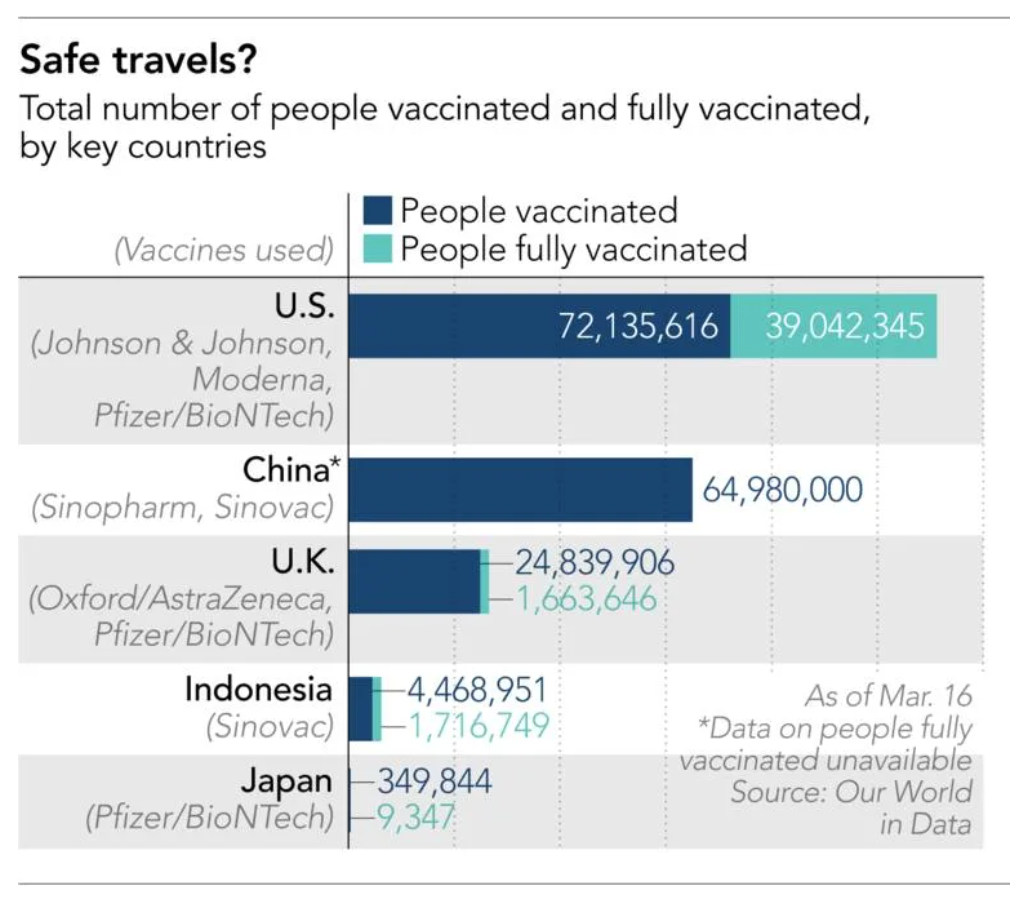
Business groups have been urging the White House to make more progress, however. “Global efforts to create CHCs are already underway,” said air travel and business groups including the US Chamber of Commerce in a letter to the White House on March 8. “And while we understand and support the critical need for an internationally harmonized approach, the US must be a leader in this development.”
Divided world
Perhaps the main obstacle to wide use of vaccine passports is political: many see them as inherently discriminatory. “The greatest risk,” Christopher Dye and Melinda C. Mills, two Oxford University scientists wrote in the most recent issue of Science magazine, “is that people for whom vaccination is unacceptable, untested, inaccessible, or impossible are denied access to essential goods and services.”
Ethical concerns about dividing the world into vaccinated and unvaccinated for purposes of travel freedom have also been widely aired. “Countries that will allow people to travel to their land will be the ones that had vaccines first,” said Cheer of Wakayama University. “We’ll have two classes of travelers: the vaccinated and the nonvaccinated. The nonvaccinated will have fewer options of countries to visit, and probably have to do more tests and longer quarantine.”
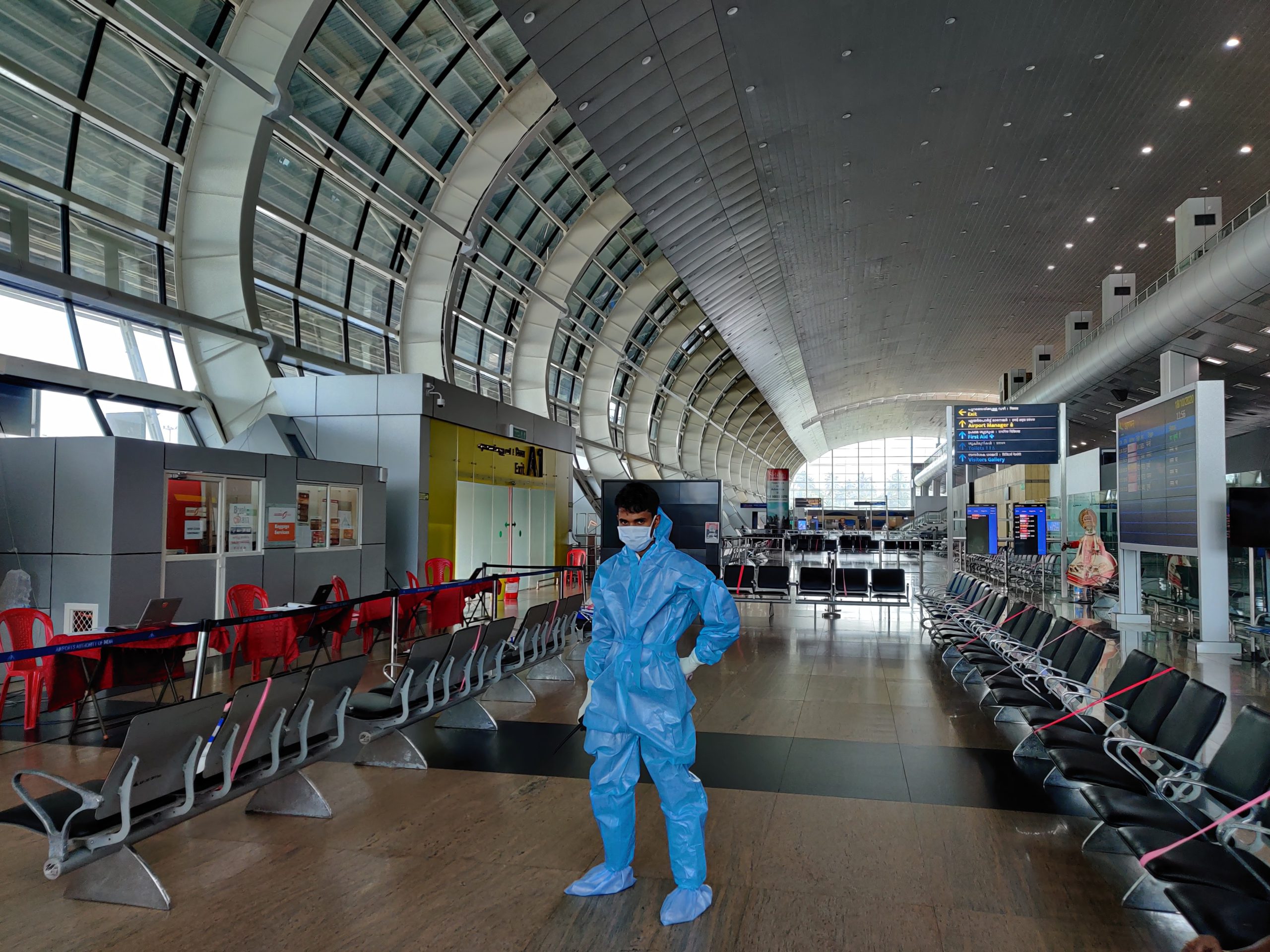
Such objections are being taken into account by the EU, which has said that to prevent discrimination it will not only offer its certificate for vaccinations but also for negative test results and for those who have recovered from COVID-19 in the past 180 days. The certificate “will not be a precondition to free movement and it will not discriminate in any way,” said Didier Reynders, European Commissioner for Justice.
But there is also the decisive question of whether vaccine passports would even work. Last year, “travel bubbles” were eagerly discussed by governments including Singapore, Hong Kong, Australia, and New Zealand in an effort to facilitate quarantine-free travel between countries with low COVID-19 infection rates. But they have so far failed to materialize on a large scale because of worries about risk.
Similarly, experts today caution they cannot say with any certainty that vaccine passports would keep countries safe from infection because not enough is known about whether vaccines prevent transmission of the virus.
The World Health Organization said in January that due to a lack of data on vaccine safety they recommended against countries issuing vaccine passports. “We are lacking critical evidence regarding whether or not these persons were vaccinated, continued to be affected or continue to transmit disease,” said Dr. Mike Ryan, Executive Director of the WHO’s Health Emergencies Program.
Given the wildly diverging views about the efficacy and political expediency of the vaccine passports, it is not surprising that there is little harmonization between governments. China’s vaccine passport, for example, only works with Chinese vaccines. The EU’s certificate, meanwhile, would work with only the four vaccines that are approved for use there. Individual EU member states may decide to accept other vaccines, including Chinese or Russian ones, which are in use in some Eastern European countries such as Hungary.
While organizations such as the ICAO have called for harmonization of global standards, few are paying much heed. “Today, different governments and different airline groups are coming up with their own systems and it is becoming really messy,” said Cheer. “What is really required is international harmonization and multilateral agreements between all the countries.”
All these concerns have not prevented a number of private organizations and companies from introducing their own vaccine passport frameworks, meanwhile. Airlines in particular, which have been hammered financially by the pandemic, are hopeful for the arrival of vaccine passports, which could encourage more air travel.
Australia’s Qantas Airways on March 12 ran its first customer trial of a CommonPass digital health app, which allows people to upload their negative coronavirus test results or proof of vaccination for international flights.
CommonPass is the result of a collaboration between the Commons Project Foundation, a nonprofit organization, and the World Economic Forum. Cathay Pacific Airways on March 15 completed its latest trial of the CommonPass involving volunteer pilots and cabin crew on its Hong Kong-Los Angeles route. United Airlines, JetBlue, and Lufthansa are among other carriers participating in the project.
Meanwhile, the International Air Transport Association made the first trial of its IATA Travel Pass app on March 17 to manage their travel health verification, with some passengers on a Singapore Airlines flight from the city-state to London.
Alexandre de Juniac, IATA’s director general and CEO, called the trial “a big win for many parties.”
“It shows that governments can efficiently manage these travel requirements with complete confidence in the identity of the passenger and the veracity of the travel credentials — importantly, avoiding long queues,” he said.
Seventeen airlines, including Emirates, Qantas Airways, and All Nippon Airways, have also announced plans for a trial. The pass is designed for airlines to embed it into their own apps.
American Airlines and British Airways have introduced another type of mobile health passport called VeriFLY, developed by US-based identity assurance company Daon. Hotel group giant Hyatt Hotels is also planning to trial VeriFLY for its meetings and events.
Another such solution, created by IBM and backed by blockchain technology, confirms an individual’s COVID-19 vaccination status or a recent negative test. The tech giant has partnered with New York state to test its software at major concert and sports venues in New York City in a pilot program that started last month.
Data privacy is a serious concern, given the number of private companies that seek access to passengers’ sensitive health data. IATA reiterates its data is decentralized using blockchain technology, so that the passenger — the only owner of data — is able to choose what health information to share with airlines and destination authorities. When sharing data, the app only shows the passenger is “OK to travel,” without giving details of health conditions. CommonPass also says data are stored or shared only with explicit, informed consent.
Survival strategy
In their eagerness for vaccine passports, however, airlines appear to be outrunning some governments’ own tolerance for risk. Vaccine passports adopted by airlines may be of little use getting into a country.
“These are currently measures taken by airlines which do not follow protocols approved by the government,” said Yuichi Yamada, chief researcher at the Japan Travel Bureau Foundation. “Given the different levels of tolerance for viruses in different countries, it remains to be seen whether such certificates will be used as important information for entry.”
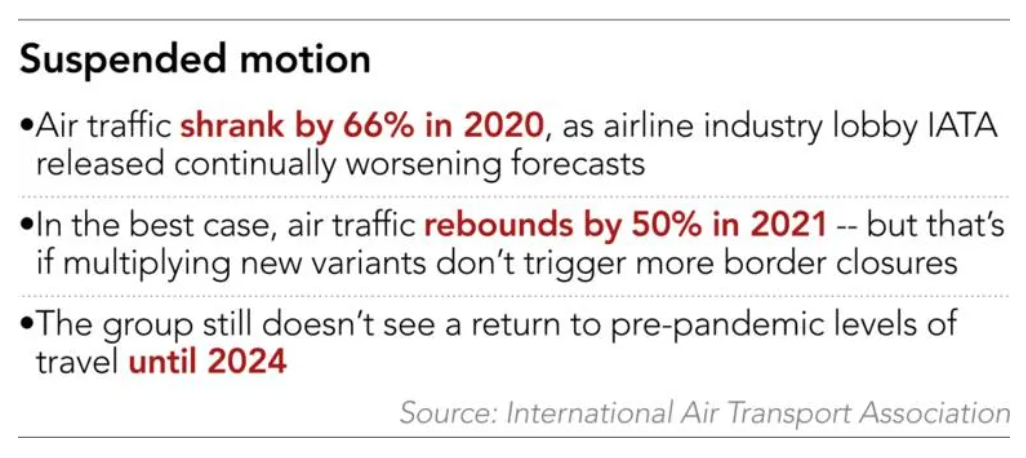
However, he said, airlines have little choice but to start now. “If airlines wait for two more years, a majority of people will either be vaccinated or hold antibodies, and international flights are expected to go back to some kind of normality without needing such passports,” Yamada added. “But they might not be able to survive until then if they stand still today. That is why they are trying to do whatever they can, even though they are not sure if these passports will actually restore international flights.”
Miku Kaminogo, a manager at All Nippon Airways who oversees alliances and international affairs, said airlines are moving very swiftly. “We want to be proactive in making use of digital health passports to be ready for the time of takeoff. We don’t want to wait until a standard is created,” she said. ANA recently announced it would trial both the IATA Travel Pass as well as CommonPass.
The Japanese government so far has not laid out a plan to approve a vaccine passport, although Taro Kono, minister in charge of the inoculation program, at a parliamentary session on March 15 acknowledged the need to follow such a system if other countries require it.
Successful pilot projects could eventually serve to “convince authorities to approve such passports,” Kaminogo from ANA added. “Governments of course need to understand that a digital passport actually works, not only in theory. This is why we are trying to make these tests, to show that we have a tool and we can work together and this could be a key to reopen the country in a secure way.”
Although many governments like Japan are being cautious about opening borders to manage risks of a resurgence of the virus, others, like Greece, whose economy depends on tourism, have bolted ahead. Greece is set to welcome foreign tourists from May 14, the start of the summer travel season. They must be either vaccinated, have antibodies, or tested negative for COVID-19. Last month, the country made an agreement with Israel — both already have vaccine passports — to allow people with such certificates to move freely between the two countries once travel restarts.
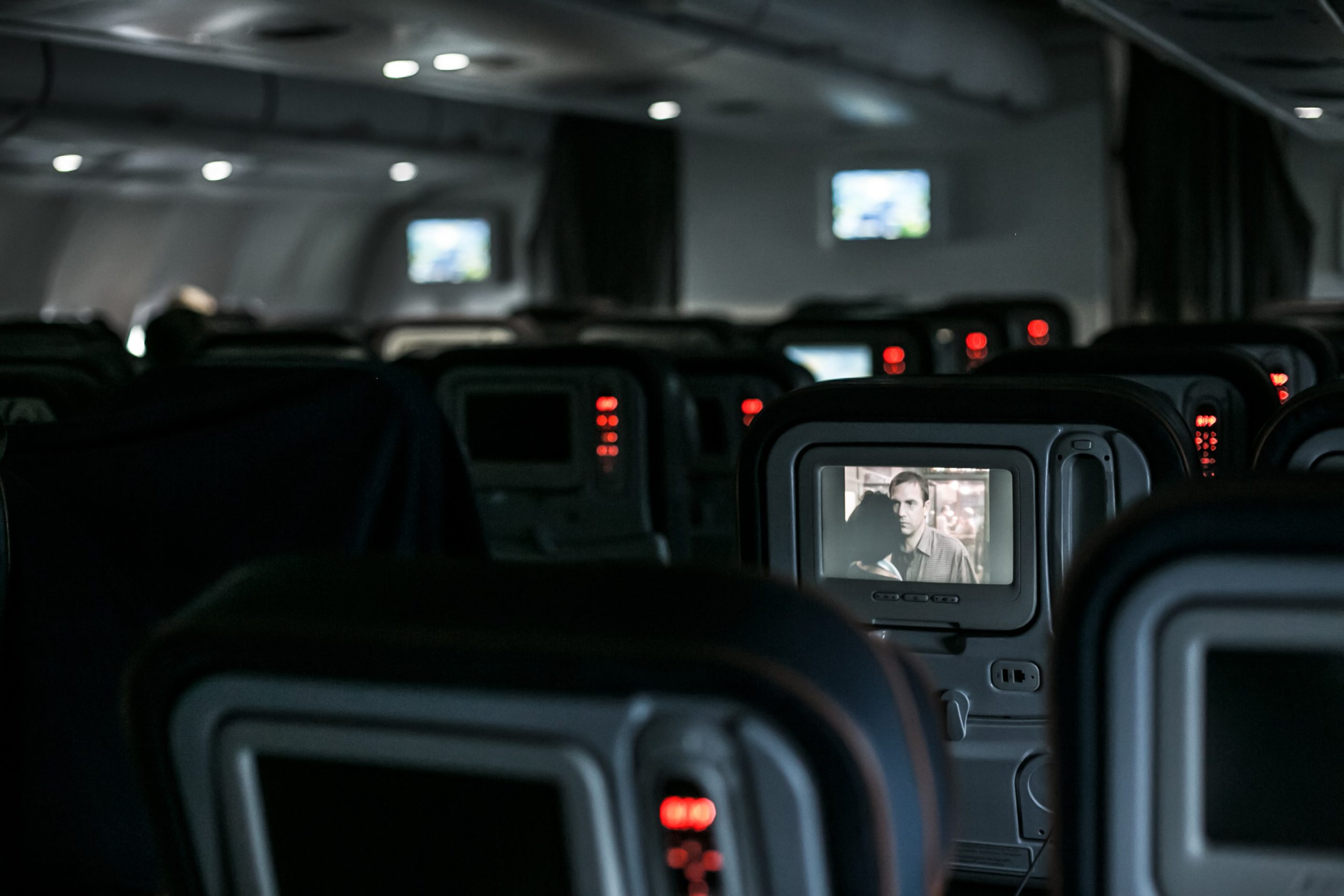
“The instinct is to first look after themselves, then to cooperate,” Cheer said, adding that an intensifying race for COVID-19 immunity among countries is hindering global cooperation. “Governments at destination are trying to compete for first arrivals to restart their tourism economies. … Spain and Greece want UK travelers,” due to the country’s high vaccination rate, he said. “Be the first place when they start traveling again and be the first airline to be on. There is competitiveness that is starting to emerge now, in destinations and airlines.”
Harmonizing standards is important for US federal agencies. Vaccine passports can only be successful “if we’re working across borders and with other countries,” said Dakota Gruener, executive director of ID2020 Alliance, a New York-based nongovernmental organization involved in setting standards for digital certificates around COVID-19.
The organization, whose founding partners include Microsoft and Gavi, the Vaccine Alliance, has brought on a range of private actors from IBM to Airports Council International to its technical standard setting initiative, Good Health Pass Collaborative, which emphasizes principles such as privacy and user-controlled data.
Important standard-setting work is also being done at the WHO with the newly established Smart Vaccination Certificate Working Group to figure out what to do with all the different vaccines, some only approved in certain parts of the world, Gruener pointed out.
In Asia, the Association of Southeast Asian Nations has started exploring a potential introduction of a common digital coronavirus vaccine certificate for the region.
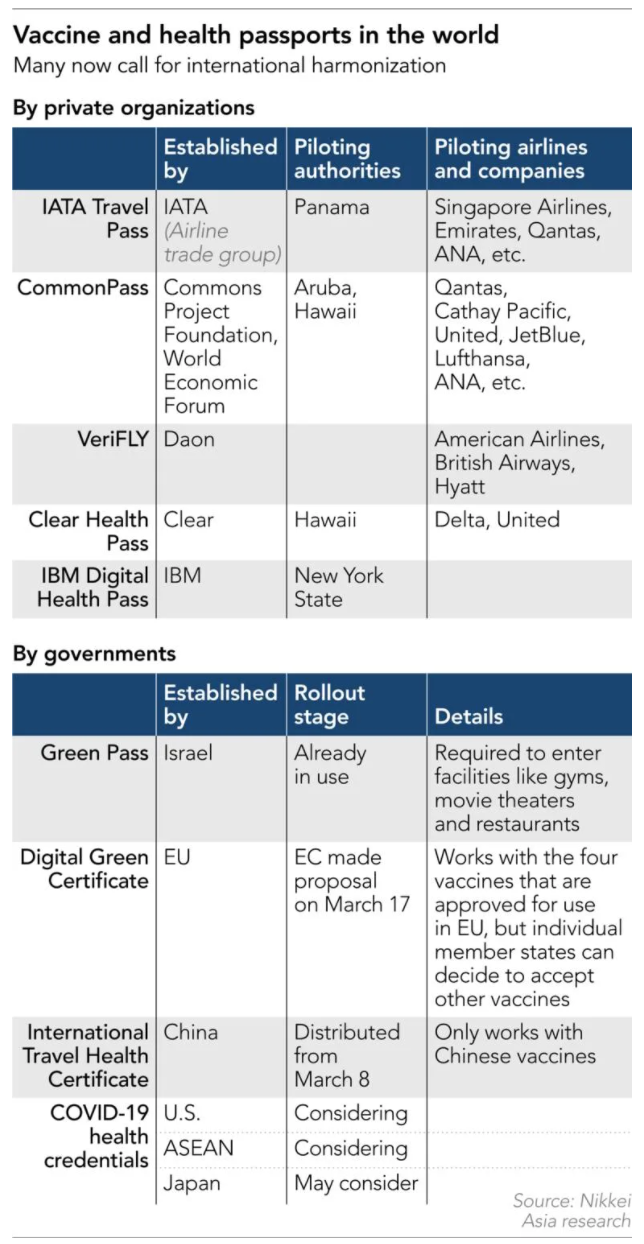
One country that was particularly keen for a common electronic proof of vaccination was Malaysia. This comes as the country’s airline industry, especially budget carrier AirAsia Group, has been pushing for a vaccine certificate. For airlines like AirAsia, which has a broad flight network in Southeast Asia, a common certificate would enable smooth operations for them.
Tourism is a core industry for much of the ASEAN bloc — even within ASEAN, there were about 51 million intraregional visitor arrivals in 2019. Some programs were launched, such as the reciprocal business travel bubble between Singapore and Malaysia, but they have not made a significant boost for the industry.
However, any discussion of a common certificate is still in the early stage, and whether this will come to fruition is unclear. The timing of the introduction has not been set. ASEAN has not explained what kind of information they will include in the certificate or how it will work on personal devices.
Singapore-based independent aviation analyst Brendan Sobie told Nikkei Asia that the regional vaccine certificate “will need to be pursued in tandem with other initiatives such as a multilateral pan-ASEAN air travel bubble in order to have a meaningful impact,” while acknowledging it is “a good first step in helping facilitate the resumption of travel between ASEAN countries.”
He pointed out that ASEAN’s initiatives to resume travel within the region have been set back so far due to “a lack of consensus and the inability to implement.” For example, the 10 members discussed a regional quarantine-free travel corridor scheme last year but it has not yet been implemented.
China, meanwhile, is pressing on with a plan to ease visa procedures for business travelers and foreigners with Chinese relatives who have been inoculated with Chinese vaccines, as Beijing attempts to accelerate economic recovery.
Unfortunately for travelers like Victor, however, China’s quarantine requirement is set to stay in place. “When the domestic public has generated a high level of immunity protection and a vaccine passport becomes feasible, China will consider adjusting the anti-epidemic measures accordingly,” Feng Zijian, an official at the Chinese Center for Disease Control and Prevention said on Sunday.
This article first appeared on Nikkei Asia. It’s republished here as part of 36Kr’s ongoing partnership with Nikkei.



